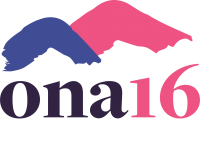A 360 Tour of Visual Storytelling
Next month, many ONA16 sessions will show you how to improve your video storytelling skills. Take a look at these sessions focusing on video, virtual reality and 360 video.
New this year: You can now ask our speakers questions in advance of the conference. Get answers to your video questions and help speakers understand what you’re most interested in learning more about by posting a question on the session page. Just click through to the sessions below and drop your question in the embedded form.
- Broadcast, Web Video and the Attention Economy. Online video can capture people’s attention in ways that print journalism can’t always do, but telling the news from an online video approach can mean taking on a very different mindset. Our team of experts will tell you how they have approached this challenge in a variety of ways. Nasr ul Hadi, ICGJ Knight Fellow – India; Molly Hughes, Director of Denver Post TV; Misty Montano, Digital Content Manager at 9NEWS KUSA and Chip Mahaney, National Director of News Recruitment at The E.E. Scripps Company, will talk about the workflow they’ve each used to produce high-quality web video, as well as best practices for gaining attention for your pieces.
- Quick Guide to Your Basic 360/VR Toolkit: As 360 video and virtual reality have grown, so has the number of tools for creating them. Lakshmi Sarah, co-founder of Tiny World Productions, Kevin Tsukii, Immersive Video Lead for Immersive Group, and Nicholas Whitaker, Training and Development Manager for Google, will give an overview of affordable cameras, audio equipment and software to help you get started.
- VR Technical Town Hall. This session, led by Robert Hernandez, Associate Professor of Professional Practice at USC Annenberg School of Journalism and ONA board member, is aimed at practitioners who are already experienced in creating VR pieces. This is a place to openly discuss best practices, tools, current and upcoming gear, along with what’s on the near horizon for this rapidly growing medium. Space is extremely limited for this session.
- VR Technical Workshop: Introduction to Unity. The more accessible virtual reality becomes, the more we are learning about it and the more we experiment. True virtual reality isn’t just 360 video; it also contains computer-designed graphic elements. We’re very excited to have our well-versed speakers, Daniel Pacheco, Professor from the S.I. Newhouse School at Syracuse University, and Ashley Pinnick, artist, VR developer and storyteller, give you a crash course on the Unity game engine. Unity is one of the most common tools for creating a true VR experience. This session will include an overview of what Unity has to offer, some pointers for getting started and resources for learning more about the platform. Though this is an introductory course, we consider this a technical workshop. This is aimed at people who are making VR content now. Please make sure you download the personal license version of Unity before the session (and preferably before you meet the hotel’s WiFi).
We’re looking forward to talking about how news organizations can create better experiences on video and beyond. These sessions represent just a small samping of what we’ll be focusing on at the conference this year. Be sure to check out the complete ONA16 program.
